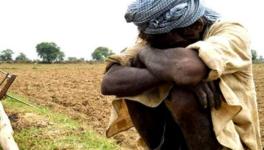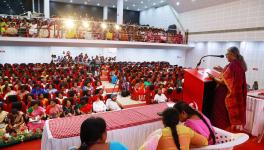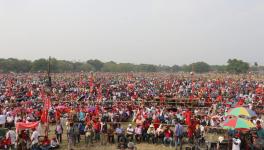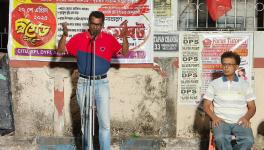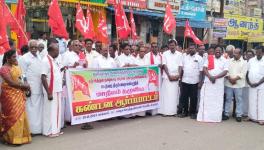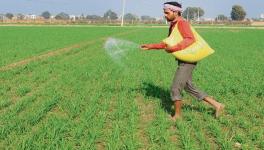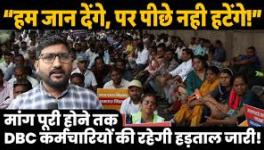Bhiwani Horror: Killing of Junaid, Nasir is Essentially an Attack on Farmers, Says AIKS
Gahtmeeka (Haryana): A joint delegation of All India Kisan Sabha (AIKS) and All India Agricultural Workers Union (AIAWU) on Thursday met the families of Bhiwani lynchings at Ghatmeeka in Bharatpur district of Rajasthan. Junaid and Nasir, residents of Ghatmeeka, were allegedly kidnapped and burnt alive by a cow vigilante group in Haryana.
The relatives of the victim families maintained that the cow vigilante groups often moved in large numbers armed with weapons. “They have been picking youth from our area and demanding extortion money from families. If they pay, they are released. The families are unable to pay money often and get their kin’s dead bodies portrayed as accidents,” some villagers said, alleging that “this illegal work has full support from Haryana Police.”
The villagers told the AIKS delegation that this was the second incident from this village. “In 2017, Umar was murdered and thrown on railway tracks. We do not know when this will end. Nobody supports us. If we go to the police station with our complaint, no one pays heed to us,” they said.
Yusuf, a youth, questioned: “What crime did Junaid’s children commit that they will have to live a life in poverty without him? Who will look after them? We want justice. After much pressure, when Rajasthan Police started acting, the Haryana Police filed a counter FIR on the policemen who went there to arrest other culprits. Why should we not see it as government support for criminals?”
He told NewsClick that communal harmony in the area was so intact in the area that Ghatmeeka panchayat had been electing a Hindu sarpanch for three terms even when there were hardly 60 Hindu votes. “If we had communal intentions, why would more than a thousand Muslim voters elect a Hindu Sarpanch?” asked Yusuf.
The residents of the village told NewsClick that the majority of Meo Muslims have been tending cattle for generations and are dependent on the sale of milk. Fakhru, a cattle rearer, showed NewsClick his dairy where he has 60 cows and five buffaloes. “I distinctly remember my grandparents and parents going to cattle markets in Bikaner and getting the best cows in the area. They never faced any harassment. Still, we do not have many problems in the Mewat area of Rajasthan. We sell milk to large dairies on rates varying between Rs 35 to Rs 40/litre depending on the quality of milk fat,” he said.
Nazim, another cattle rearer, who has 30 cows, told NewsClick that the topography of the area was quite supportive with abundance of green patches, which reduces costs for cattle fodder. “We only have to look after them in the winter months, otherwise they go to jungles for grazing and return in the evening,” he said.
When asked if they ever considered leaving cattle rearing following terror of cow vigilante groups and a regressive law in Haryana restricting movement of cattle, both declined any such contemplation. “How will our families survive if we leave this trade? We are not literate enough to get a job in the city. This (profession) is an inseparable part of our existence.”
Talking about the incident, Ram Avtar, sarpanch of Ghatmeeka, told NewsClick that they learned about the abduction of the two men when their acquaintances from Ferozpur Jhirka called them and told them that Junaid and Nasir were in the custody of the crime investigation agency of Haryana Police.
“When we went there, we found they had been handed over to the men of Monu Manesar. Puzzled, we decided to launch a complaint of abduction with the Rajasthan Police. Late in the night, our complaint was registered. Next morning, we were informed that two charred bodies had been found in a vehicle. When the police looked for the chassis number, it matched the vehicle Junaid had taken along with him,” he said.
Avtar alleged the modus operandi of these vigilante groups “in connivance” with Haryana Police has been to harass Muslim men by demanding money. If they decline to pay, they are usually booked in cases related to occupation of unlicensed arms, he said. “We recently saw one case when one person was arrested with a country-made gun. Since these are poor people, nobody comes to defend them. Just look at the case of Umar who was killed in 2017. The case is yet to see its first hearing.” he added.
Handing over the cheques of Rs 1 lakh each to victim families, P Krishna Prasad, finance secretary, AIKS, said it was merely a relief to the families and they would ensure that legal help reaches the families and justice is delivered.
“This is not our first visit here. We came here when Pehlu Khan was murdered. We ran a countrywide campaign against this violence and provided relief of Rs 10 lakh to his families and Rs 5 lakh to other injured victims. We came here when Umar was murdered. Today, we are here to tell you that you are not alone in the struggle for justice.”
Prasad said the ruling Bharatiya Janata Party may push a narrative that Hindus are polarised in their favour, but this was not true in all states.
“I come from Kerala. We never let them win there. Only one MLA was elected once. We ensured he was defeated in the next elections,” he said, and said this was “not an attack on Muslims but all classes, be it farmers or workers.”
The AIKS leader called upon villagers to call a mahapanchayat. “We will ensure that leaders of the farmers' movement, be it Rakesh Tikait or Joginder Singh Ugrahan, will come here to share your grief and struggle,” he added.
Maulana Hanif, who is leading the agitation at a local mosque for justice, also met the AIKS delegation. “We have been here before the advent of Babur. We defeated Gyashuddin Balban. We fought against Babur. We even fought Akbar in the army of Rana Sanga. Yet we have been demonised as killers of cows. We have been protecting it for ages. Lumpy (disease) hit us so hard. Yet we serve them selflessly,” he added.
Talking to NewsClick on the sidelines of the protest site, Vijoo Krishnan, AIKS general secretary, said that the attacks by cow vigilante groups were primarily aimed at destroying the cattle economy.
“When we talk about the Mewat region, we must understand its character, that Meo Muslims have been traditionally keeping cattle and trading milk. When Pehlu Khan was murdered, we ran a country-wide campaign. The engagement of the Muslim community caring for the cows goes against the image of Muslims portrayed by the RSS in the rest of the country. Essentially, it is an attack on farmers. In these times, when political parties do not want them associated with Muslims, it becomes a constitutional and moral duty of us to stand with them.”
Get the latest reports & analysis with people's perspective on Protests, movements & deep analytical videos, discussions of the current affairs in your Telegram app. Subscribe to NewsClick's Telegram channel & get Real-Time updates on stories, as they get published on our website.












